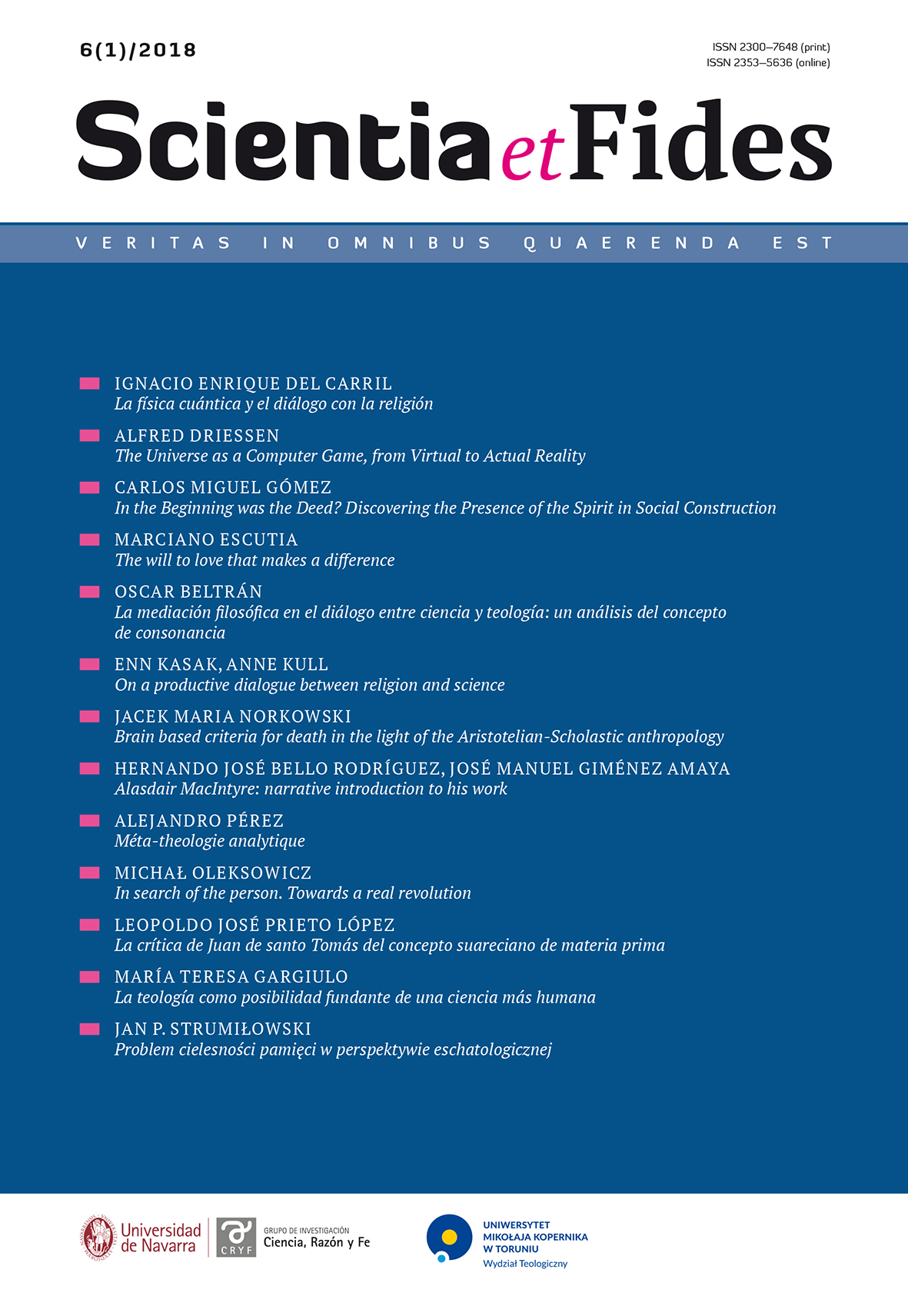In the Beginning was the Deed? Discovering the Presence of the Spirit in Social Construction
Keywords
Social sciences and religion, contingency, origin of meaning, anti-realism and diversitAbstract
The relationship between socio-constructionism and Christian theology has not been sufficiently explored. This paper critically analyses some of the main insights of socio-constructionist theories and suggests that a reinterpretation of the idea of social construction from a theistic perspective can avoid the unresolved problems of its radical versions. The paper argues that an order of meaning, whose origin cannot be reduced to human action, has to be presupposed for practices of social construction to work. This resonates with the belief in God´s action in human reality.References
Berger, Peter and Thomas Luckmann .1967. The Social Construction of Reality. A Treatise in the Sociology of Knowledge. New York: Anchor books.
Berkeley, George. [1710] 1982. A Treatise Concerning the Principles of Human Knowledge. Indianapolis: Hackett.
Bloor, David.1976. Knowledge and Social Imagery. London: Routledge and Kegan Paul.
Boghossian, Paul. 2006. Fear of Knowledge. Against Relativism and Constructivism. Oxford: Clarendond Press.
Butler, Judith. 1995. “Contingent foundations”, in Feminist Contentions, edited by S. Benhabib, J. Butler, D. Cornell and N. Fraser, 35-57. New York: Routledge.
Burr, Vivien. 1998. “Overview: Realism, Relativism, Social Constructionism and Discourse”. In Social Constructionism, Discourse and Realism, edited by Ian Parker, 13-25. London: Sage.
Burr, Vivien. 2003. Social Constructionism. Second edition. London: Routledge.
Collingwood, R.G. 2014. An Essay on Metaphysics. Oxford: Clarendon Press.
Dreyfus, Hubert and Charles Taylor. 2015. Retrieving realism. Cambridge Ma: Harvard University Press.
Elder-Vass, Dave. 2012. The Reality of Social Construction. Cambridge: Cambridge University Press.
Evers, Dirk. 2015. “Contingent reality as participation”. Philosophy, Theology and the Sciences 2 (2): 216-242.
Foucault, Michael. 1972. The Archaeology of Knowledge. Trans. A.M. Sheridan Smith. New York: Pantheon books.
Foucault, Michael. 2002. “Truth and the Juridical Forms”. In Power: Essential Works of Foucault 1954-1984, Edited by James D. Faubion, 1-89. London: Penguin books.
Gadamer, Hans-Georg. 1975. Truth and Method. London: Continuum.
Gergen, Kenneth. 2001. Social Construction in Context. London: Sage.
Goethe Johann Wolfgang. 1898. Faust. A tragedy, trans. Bayard Taylor. Boston and New York: Houghton Mifflin.
Gómez, Carlos Miguel. 2017. “Historicidad, realismo y verdad”. Principia, An International Journal of Epistemology, 21, 1
Goodman, Nelson. 1978. Ways of Worldmaking. Indianapolis: Hackett.
Habermas, Jürgen. 1981. Theorie des kommunikativen Handelns. Band 2: Zur kritik der funktionalistischen Vernunft. Frankfurt: Suhrkamp.
Hacking, Ian. 2000. The Social Construction of What? Cambridge MA & London: Harvard University Press.
Hefner, Philip. 1993. The Human Factor. Evolution, Culture and Religion. Minneapolis: Fortress.
Heidegger, Martin. 1963. Sein und Zeit. Tübingen: Max Niemeyer.
Husserl, Edmund. 1970. The Crisis of European Sciences and Transcendental Phenomenology. Evanston: Northwestern University Press.
Kukla, Andre. 2000. Social Constructivism and the Philosophy of Science. London & New York: Routledge.
Latour, Bruno (1987). Science in Action. Milton Keynes: Open University Press.
Nietzsche, Friedrich. [1873] 2010. “On Truth and Lie in a Nonmoral Sense”, in On Truth and Untruth, edited by Taylor Carman, 15-49. New York: Harperperennial.
Nietzsche, Friedrich. 2001. The Gay Science. Cambridge: Cambrige University press.
Ortner, Sherry. 1984. “Theory in Anthropology since the Sixties”. Comparative Studies in Society and History 26 (1): 126-166.
Pannenberg, Wolfhart. 1985. Anthropology in Theological Perspective. Edinburg: T&T Clark.
Rorty, Richard. 1989. Contingency, Irony, and Solidarity. New York: Cambridge University Press.
Smith, Christian. 2010. What is a Person? Rethinking Humanity, Social Life, and the Moral Good from the Person Up. Chicago and London: University of Chicago Press.
Taylor, Charles. 1993. “Engaged agency and background in Heidegger”. In The Cambridge Companion to Heidegger, edited by Charles Guignon, 317-336. Cambridge University Press.
Turner, Stephen. 1994. The Social Theory of Practices. Tradition, Tacit Knowledge and Presuppositions. Cambridge: Polity.
Von Glasersfeld, Ernst. 1984. “An Introduction to Radical Constructivism”, in The Invented Reality, edited by Paul Watzlawick. New York: Norton.
Wolterstorff, Nicholas. 2014. “The World Ready-made”. In Practices of Belief, 12-40. Cambridge University Press.
Downloads
Published
How to Cite
Issue
Section
License
CC BY ND 4.0. The Creator/Contributor is the Licensor, who grants the Licensee a non-exclusive license to use the Work on the fields indicated in the License Agreement.
- The Licensor grants the Licensee a non-exclusive license to use the Work/related rights item specified in § 1 within the following fields: a) recording of Work/related rights item; b) reproduction (multiplication) of Work/related rights item in print and digital technology (e-book, audiobook); c) placing the copies of the multiplied Work/related rights item on the market; d) entering the Work/related rights item to computer memory; e) distribution of the work in electronic version in the open access form on the basis of Creative Commons license (CC BY-ND 3.0) via the digital platform of the Nicolaus Copernicus University Press and file repository of the Nicolaus Copernicus University.
- Usage of the recorded Work by the Licensee within the above fields is not restricted by time, numbers or territory.
- The Licensor grants the license for the Work/related rights item to the Licensee free of charge and for an unspecified period of time.
FULL TEXT License Agreement
Stats
Number of views and downloads: 521
Number of citations: 2



